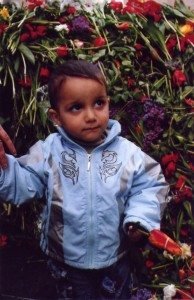The man who brought you “Georgetown Boys,” “Silence,” and “Mirrors” has a new project these days, one completely devoid of the theater and stage.

Dr. Herand Markarian is tipping his hourglass over and delving into live history, documenting the stories of genocide survivors and victims as his contribution to the centennial in 2015.
He calls his latest endeavor “Project Testimonies.” Although in its infantile stages thus far, the response he’s received worldwide is off the metered charts.
And he’s gotten the support of veteran editors Iris Papazian (New Jersey), Iris Chekenian (New York), Raffi Setian (California), and yours truly (Massachusetts).
Markarian is moving a mountain with this initiative—one that should have been budged years ago. But like the rest of us, he’s been so busy writing plays and diligently serving his Armenian community that such necessities were sometimes shoved in the back burner until time allowed.
Well, the hourglass has run its course. Now it’s time to start fresh and get this project completed by 2015 and into the hands of proper people and places of interest.
“Every Armenian has a story about their ancestors’ ordeals during the Armenian Genocide,” Markarian tells us. “Let us honor, preserve, share, and document the memories of the martyrs and survivors. Let us tell the stories of those who were silenced. It’s our obligation.”
One of the first to come forward with his report was Mesrob Odian, an activist with Camp Haiastan and other endeavors. He wound up sending an 18-page history. Right behind him was Archbishop Oshagan Choloyan, prelate of the Prelacy (Eastern), who will soon be joined by Archbishop Khajag Barsamian, primate of the Diocese (Eastern).
Of the first 12 respondents, half were in Armenian, and were diligently translated by Markarian. Three other manuscripts were handwritten and between 300-400 pages. They will be condensed accordingly, properly edited, and bound into books in a series of English volumes.
More than two dozen other folks throughout the country have promised articles on their ancestry from clergy to laypeople, prominent to ordinary. Authors from around the world have also sent along their books to peruse. These will likely be left intact because they’re already published.
Everyone, it seems, is in a genocide mode these days, particularly with preservation. The fact I was able to record my own mother’s history while she was still alive and lucid was my family’s crowning achievement.
And what was done with it? The 25-minute video I had recorded was shown to residents of the nursing home where she lived. Three other Armenian residents were in the audience with her that afternoon.
So were 30 other patients, many of them immigrants who identified our ordeal with their own encounters. Hands flew up at the bare mention of Ellis Island. Jews. Italians. Irish. Polish. All were moved by their own personal history.
My incentive gets even more motivational, now that Markarian has launched “Testimonies.” It’s time to grind out my mother’s written story and include it with the rest.
I never got to record my father’s survival account. All I know is, he survived the genocide and never spoke about it. My mother didn’t, either, until I caught her in a weak moment. Once the ice was broken, she never stopped talking about it.
I see teenagers like Anahis Kechejian and the programs they’re launching in our midst at genocide commemorations. Her initiative is called “Stand up for Your Survivor” and she’s mobilized the entire Greater Boston community.
With Markarian, the world has become his oyster. With the help of Hamazkayin and what he may receive from sympathizers, the venture will gain impetus; it always has with the productions he’s been able to conjure throughout our Armenian Diaspora.
In addition to the 25 plays he’s written, Markarian has directed more than 40 plays, appeared in more than 50 roles, including “Assignment Berlin,” and was recently honored by the government of Armenia for meritorious service.
“Silence” was performed to capacity crowds off-Broadway last year and received critical acclaim. It told the story of love, loss, and the relentless search of a woman for her son following the genocide.
The best, however, is yet to come with “Testimonies,” which he’s subtitled, “The voice of the people.”
He’s got it connected to a nutmeg called Libra-6 Productions, a not-for-profit organization pursuing humanitarian values through theater, art, and cultural events.
“Memories are testimonies…documentations…calls for justice,” he said. “Bringing these true, untold stories to life is the obligation of our generation.”
Those wishing to submit an account of their family’s experience in the genocide may send manuscripts to Dr. Herand Markarian, Libra-6 Productions, Inc., 160 Waters Edge, Congers, NY 10920, or e-mail libra6productions@gmail.com.
Consider it your moral obligation to get involved.


What is the status of “Project Testimonies?” When is it likely to be published?